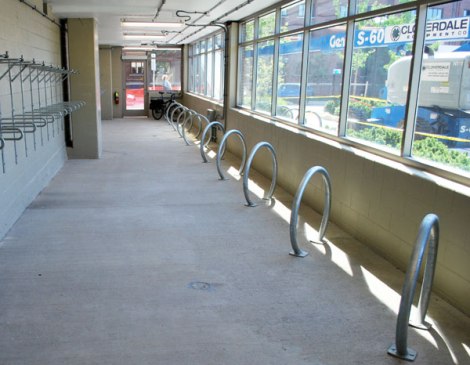We know that biking is good for us—but is it good for business? Let’s distill a blog series by People for Bikes and Triple Pundit to take a closer look at reasons why employers and governments should be supportive of cycling when planning infrastructure and promoting towns, cities and regions.
In recent years, bicycling has gained traction as a viable transportation option for commuting and reaching destinations around town. Nationally, bike commuting has increased by 10% since 2011, and more than 61% since 2000. Businesses and government have a prime window of opportunity to capitalize on this trend, not just as a matter of social responsibility but as a boon to the bottom line.

By encouraging bicycling, businesses and governments can take advantage of several benefits. (Photo Source)
Bicycling to work can help enhance employee health, thereby lowering health care costs for their employer. The blog series mentions several health benefits of bike commuting, including improved cardiovascular health, better mental health, and stronger immune systems. As health care costs continue to rise, encouraging bicycling commuting is a proactive step to lower costs. The Centers for Disease Control estimates that employees bicycling to work could save employers 5-12% on health care costs.
Bicycling to work can also help increase employee productivity, contributing to a more efficient workforce. Author Bob Siegel makes a strong case that promoting biking is an investment, and increased productivity will offset infrastructure costs the employer may incur. Benefits mentioned include:
- Exercising before work raising an employee’s productivity by an average of 15 percent.
- Cyclists taking 15 percent fewer days off work due to illness.
- Statistics that show non-cyclists take two more sick days per year.
- Studies that show a 4-15 percent increase in productivity, and 27 percent fewer task errors for physically fit employees.
For Michigan employers looking for an extra edge (not to mention healthier employees), encouraging bicycle commuting is an innovative way to boost productivity.
What can early adopters do to encourage bicycling to work? The League of American Bicyclists lists several strategies for businesses participating in its Bicycle Friendly Business program. Employers can provide cash incentives for biking to work, secure bicycle parking, reimbursement for purchasing bicycling gear, and provide locker or shower accommodations. Management can work with local cycling groups and city officials to make bicycling more user-friendly, and can provide employees with bicycling education, such as maps or safety literature. In Michigan, 14 businesses are certified by the League as Bicycle Friendly Businesses, including Trans4M membersMichigan Fitness Foundation and the League of Michigan Bicyclists.

The University of Michigan offers indoor bike parking in one of its parking garages. (Photo source)
Michigan governments have even more incentive to promote bike commuting and invest in bicycling infrastructure. As employers, Michigan governments reap the same productivity and health care benefits as private and non-profit entities mentioned above. Further, bicycling infrastructure has positive effects on the city as a whole. Increasing ridership numbers show the public’s affinity for using bicycles as a serious mode of transportation. At the same time, fewer Americans are driving cars, especially younger people. These trends point to residents wanting to live in cities that accommodate biking and other nonmotorized modes of transportation. Having bike-friendly infrastructure contributes to healthier communities, less traffic congestion, and is a great way to attract millennials and the younger “creative class” that provide aneconomic and social boost to communities. Biking infrastructure fits in perfectly with various placemaking efforts underway in Michigan communities. Bike sharing programs accomplish the same result, increasing a city’s attractiveness as a place to live and visit. Michigan’s fledgling bike-sharing infrastructure is set to take a great leap in 2014, with bike-share programs operating in Detroit, Lansing, and Traverse City, and programs planned in Ann Arbor and Mount Pleasant.
From an economic standpoint, bicycle infrastructure improvements can be a driver of economic development. In Portland, Oregon, the City Club of Portland completed a first-ever cost-benefit study of bicycling investments in a U.S. city, and found that for every dollar spent on cycling-friendly projects, between $1.20 and $3.80 was returned in health and fuel savings. Local businesses benefit from increased biking and pedestrian traffic, especially when the businesses are located near bike racks. Cyclists riding in the city frequent retailers more often than drivers and spend more money on average, and Realtors often see bike infrastructure as a selling point for properties. In Indianapolis, homes close to the city’s Manon trail are worth 11% more than homes a half mile away, with all other variables controlled.
Bicycling advocacy and infrastructure make good economic sense for Michigan businesses and governments. Continued advocacy by employees and residents will help get programs and improvements where they need to be, benefiting both the employee and employer. Bicycling infrastructure will facilitate local business and help make bike-friendly cities desirable places to live, work, and play. Bicycling is on the rise in Michigan, and those who capitalize on the trend will reap the benefits.
###
Written by: Jeff Prygoski, Fellow, Transportation for Michigan
Cover photo credit
















Leave a comment
Comments feed for this article